Narrator Baguette: Read all about it! Personal accounts on the Isabelle Dubois trial and even her personal journal excerpts beginning in 1428! The following series of entries are inspired by and adapted from the events leading to, during, and succeeding the trial of Joan of Arc. The events and attitudes of the 1429 period of the 100 Years’ War are contextualized, which was extremely influential in this case. Then, the disposition of witchcraft in the 15th century under inquisitorial procedure will be discussed. After, rise of skepticism of Isabelle Dubois, the inspired character, will be on the rise leading to capture, accusations, verdict, and appeal.
A: Context
Isabelle Dubois: Journal Entry May 5, 1428 – The voices have continued. St. Michael and St. Catherine’s presences have become more vivid. I hear them on my right side. A light shines from where I hear them. I am the saviour of France. They have advised me to go to Vaucouleurs and find Robert de Baudricourt, the garrison commander, and a supporter of Charles. I must listen to St. Michael and St. Catherine, as I am the chosen one. I will attend today’s mass and then begin my journey. I attend mass regularly and I take confession frequently.
Isabelle Dubois: Journal Entry February 23, 1429 – Robert has given me five coursiers at the king’s expense, seven trottins, and an escort of several soldiers.[2] I have requested the heir that the duchy of Lorraine to accompany me.[3] I am going to cut my hair, much shorter than a woman’s convention, and dress in men’s clothes while I embark of an 11-day journey across English territory to Chinon, where Dauphin Charles’s court presides.[4]It is far safer to travel as a man than as a women. I cannot be as successful as the men whilst wearing a bonnet and layered dress! There will be little food and much sacrifice, but this is what I am told to do.
Isabelle Dubois: Journal Entry April 29, 1429 – With faith in God, and I as His messenger, Dauphin Charles agreed to let me accompany a convoy of soldiers and supplies to Orleans, of which is under great siege from the English Army.[6] If God shall prevail, we will win this war and Charles will rule the lands as king, rightfully. I have arrived in Orleans, our northernmost city loyal to the French crown, giving us access to the Loire River.[7] For the last six months, it has appeared that the English have been winning, but that is very soon to change.
Isabelle Dubois: Journal Entry May 8, 1429 – Victory! With my holy word, our nation has found supremacy over the English! Although the commanders deceived me, I ordered an immediate attack on St. Jean-le-Blanc on the south bank.[10] A fleet of boats sailed down the river to pick up the supplies I had brought to the city, along with me and around 200 other soldiers.[11] Upon my entrance onto the boat, the wind which had brought the boats upriver reversed itself, aiding us to sail back to Orleans under the cover of darkness.[12]I will distribute food to the people of Orleans and salaries to the garrison.[13] I have commanded that the English bastions depart. Some have threatened to kill me, calling me an emissary of a witch.[14]Heaven forbids! I am a messenger of God! A prophet! The great saints have spoken to me – chosen me. This is not an act of deception or maleficium!
Isabelle Dubois [speaking to Dauphin Charles outside of Tours on May 13]: Good Sir! It is with my purest pleasure to report to you that we have succeeded in our mission to occupy this rightfully French territory back from the English! I wish to march northeast into Champagne, towards the Rheims![15]
Dauphin Charles: Hon! Hon! Hon! Bien Isabelle! We must bring the Loire back into the safety of French hands, and after we may feel safe enough to march on Rheims without an English attack.
Father Bernard [at Mass on May 15, 1429]: Glory! Glory to God in the highest and peace to the people of good will. With great happiness, I received a letter from the war commander announcing that with grit and the power of faith in our Lord, we, the French, have defeated the English in the Siege of Orleans![16] This is our first major military victory since the 35th rengal year of our beloved king Charles, and we have regained the throne![17] With God’s good will, it will not be the last victory for our soldiers, and we will reclaim to Loire!
Pope Martin V on June 3, 1429 addressing the Catholic people: People of good faith, I am here to address you today to remind you that in these times of strife – war, pestilence, famine, and religious turmoil, one must rely on their purity and good catholic values to refrain themselves from evil.[18] Let us remember the word of St. Thomas, a heretic is one of infidelity who professes the faith of Christ and corrupts its dogmas.[19] Retracking Christ’s doctrine and privation of faith is the greatest evil, allowing vulnerability for the corruption of the Devil to take control of the unfaithful and undevoted. All inquisitors must be wary of heretical depravity, that Satan had so bewitched some Christians in which they ae sacrificed to demons, do homage to them, and sign a pact to which they are a servant to any evil desires.[20] One must be vigilant, for this new heresy is much more dangerous than that of the past, this new innovation, new sect, is directed under the personal tutelage of the devil, who worship evil and possess maleficent diabolic powers.[21] For this is the only reason that such hardships are being endured during these turbulent times.
Isabelle Dubois: Journal Entry July 17, 1429: It has been due time since my last entry, however, for good reason. A month ago, under my banner, The Loire Campaign was deemed a success and the Loire was back under French rule.[22] We won our first significant field victory in years, defeating the English at the Battle of Patay on June 18th.[23] Enemy commanders, the Earl of Suffolk and Lord Talbot were taken prisoner. Our army had marched through hostile Burgundian territory. Great success! Our march on Rheims began on June 29th and we reached the Rheims today.[24]I paraded in with the Dauphin Charles by my side, and finally, true to the messages delivered by St. Michael and St. Catherine, the dauphin was consecrated as King Charles VII of France.[25]
Archbishop of Reims Renault Chartres: With great pleasure I present the Holy Ampulla to the Noble Charles VII King of France on this holy day of coronation ceremony on Sunday, July 17, 1429.[27] By signing this document, you are made the rightful monarch, anointing you the sacred sign of legitimate power authentically appointed by God.
The Bishop of Noyon: *quietly to The Bishop of Langres* It is interesting that this previously peasant girl has such great support from the king and his nobles…
The Bishop of Langres: *responding quietly to The Bishop of Noyon* Hmmm… that is a good point. It is almost too interesting. Why would they have trusted her without question? How come when she joined the army, they won? It is almost as if she has them under some sort of spell or something…
Woman in attendance: It is so great to see a woman, of whom the king does not intend to wed, by the side of the king in such a significant moment. I wonder if this is the start of women’s power in this nation.
Isabelle Dubois at King Charles VII’s coronation: Noble King, I have executed the pleasure of God who wished I lift the siege of Orleans and bring you to receive your holy coronation in this city of Rheims to declare that you are to whom the kingdom of France diligently belongs.
Isabelle Dubois: I am announcing that I will relieve Compiegne from an English siege as I did in Orleans!
B: Accusations and Speculation Against Isabelle Dubois Begin
Henry VI of England on Isabelle Dubois: She mustn’t be trusted! She, who is not human! An animal – a puppet of Satan! For, there is only one explanation to her tyrannical ways. She, who hides her identity with short hair and masculine clothing![28] Do not let voices that she claims are the word of God fool you! More comprehendible is that they are workers of the Devil disguised to deceive and manipulate; Satan’s minions, who have made their way closer and closer to the people of pure faith and virtue! Isabelle Dubois is not a prophet. She must be captured and prosecuted for her heresy against the Divine!
Conrad Fredericks of Burgundy to his soldiers: Men! Henry VI may have a point. I don’t know if it is necessary to listen to that witch accusation jumble, but she is far too powerful. The disgrace if we were to be overthrown by a woman – no, a girl! We must do everything we can to capture her. The English want her so badly…we may even make some money off her.
Conrad Fredericks of Burgundy in Compiegne [May 23, 1430]: Mwah-ha! She has been captured! She has been captured! We, the great Burgundians, have captured Isabelle Dubois. We’ll hold her and then sell her to the English and make some money!
Narrator Baguette: On June 6, 1430, after negotiations, the Burgundians sold Isabelle Dubois to their allied English. After 6 months of imprisonment, the beginning of a long trial commenced. The trial took place in Rouen. Rouen was the English capital city and the King of England’s military headquarter in occupied France at the time of the trial.
C: The Trial
Duke of Bedford on June 6, 1430: Imprison her! Throw that witch in the cell – contain her!
Isabelle Dubois: I am a prophet! I am the chosen one! I am a messenger of God’s word. Devoted to the faith! I deny any charges. This is ludicrous. You will be punished by the Divine Himself for this wrongful accusation, you will see! In due time…in due time!
Judge Fromage:
In the name of the Lord, Amen. In the month of December on the 20th day in the year of our Lord 1430, it came to the ears of the official through the report of general rumor and the evidence of clamorous notification, that Isabelle Dubois of Domrémy-la-Pucelle, France, participated in acts of heresy pertaining to acts of sorcery in violation of the Faith and the common good state. These transactions were conducted on the 8th day of May of the year 1429. In presence of good judgement today is my notary, Sir. William, who will assist in the capacity of record-keeping, a variety of practitioners, both clerical and lay, are standing by ready to provide necessary countermeasures.[30] We are also joined with the Bishop of Beauvais, the Vice Inquisitor of the Faith, and doctors of the University of Paris.[31] The combination of sorcery, heresy, and occult constitutes devil worship and the abolishment of accomplices, such that of witches, as per the inquisitorial papal mandate.[32]Here begin the proceedings in matter of Faith against, Isabelle Dubois.
It has pleased divine Providence that a woman of the name of Isabelle, should be taken and apprehended by the Burgundians within the boundaries and limits of this Rouen diocese and jurisdiction.[33] The reputation of this woman has gone forth into many parts: careless of all the modesty of womanhood, wearing immodest garments dawned by the male sex, using the Lord’s name in vain by claiming that the good saints, St. Michael and St. Catherine, have delivered the words of God to this self-proclaimed, falsely identified “messenger” of the good Lord.[34] The King in his providence, with desire to succor the good faith, surrendered this woman to us to hold a complete inquiry into her acts and sayings before proceeding further, according to ecclesiastical laws.[35] We ask that the notable church of Rouen grant us territory to make this inquiry with the opinion of experienced authorities in canon and civil law.[36]
Narrator Baguette: Where inquisitorial procedure prevailed, like would have in this trial, denunciations were secret and carried little risk and torture was freely applied.[37] Early and severe persecutions of witches and sorcerers often occurred in regions of overlapping jurisdictions, courts, magistrates, and procedures, which Rouen would have been categorized into.[38]
Duke of Bedford on December 20, 1430: Release the witch! Put her on the stand!
Isabelle Dubois: You are wrongfully mistaken! God will punish you!
*Isabelle was led to the stand, brought in by an usher*
Judge Fromage: Isabelle, today you are on trial for the acts of heresy. You were taken and apprehended within the boundaries and limits of our diocese. Within these boundaries, many, but not all of your actions were committed. The people believe that these acts, which have spread throughout all the realms of Christendom, injure the orthodox faith. Our lord, King Henry VI, has delivered this woman to us to be tried in matters of the faith according to law and reason.[39] Considering public rumor and report of aforesaid acts, we decree that the accused, Isabelle Dubois, should be summoned and citied by letter to answer the interrogations in truth according to law, reason, and faith.
Court Clerk: Isabelle Dubois, state your name and answer the following: do you swear on the four gospels to tell the truth, as punishable by God?
Isabelle Dubois: My name is Isabelle Dubois of Domrémy-la-Pucelle. I do swear to tell the truth; however, I do not know what information you are trying to serge out of me.
Court Clerk: Who are your parents?
Isabelle Dubois: My father is Jacques. My Mother is Bernadette.
Judge Fromage: Where were you baptized? Who baptized you?
Isabelle Dubois: I was baptized in the church of Domrémy. Father Jean Corchet baptized me.
Judge Fromage: How old are you?
Isabelle Dubois: I am nineteen years old.[40]
Judge Fromage: Take her back to her assigned prison In the Castle of Rouen. Secure her with the chain and bonds of iron. Dare you not try to flee. We will commence this trial at a later date.
February 13, 1431 – Session 2 of the Trial
Lord Inquisitor: We gather here again. You have had an increased opportunity to think about your sins in advance to coming before the court. Do you swear upon this oath of honesty?
Isabelle Dubois: I swore the other day! That must be enough. Why must you overburden me in these already absurd times? I swear to speak the truth on that which concerns the faith.
Lord Inquisitor: Very well. Let us continue with the questioning then. In your youth, did you learn any craft?
Isabelle Dubois: Yes, I learnt to sew and spin.
Lord Inquisitor: Do you confess you sins once a year? And take communion on a regular basis?
Isabelle Dubois: Yes, to my local curate. When he was away, with his permission, I confessed to another priest. I take communion whenever I can.
Lord Inquisitor: When did you start hearing voices?
Isabelle Dubois: I was thirteen.[42] I heard the voice on my right side. God was guiding me toward the church. Along with the voice guiding me, I saw a light. Sometimes more faint than other times, this light appeared on the same side as the voices.[43] The second time this voice came to me, I was sure that it was the messages of God. By the third time, I was near the stream, washing my clothes, and I was sure that it was the voice of an angel that had come to me to spread the word of the Lord to me. I know that it was the savior’s message because I was always protected and given divine advice. The voices guided me to salvation. They taught me to go to church more often and always act in good faith. The voice advised me to raise the siege of Orleans. They ensured me that Robert de Baudricourt would provide an escort for me. When I arrived in Vaucouleurs, even though I had never met him, I knew who Robert was because the voices told me. It took me three tries to convince Robert to provide me an escort. I told the duke that whatever soldier he sent, I would pray for, in good and bad health.
Lord Inquisitor: How do you know that these voices are from the saints?
Isabelle Dubois: Each time they came to me, they led me to the church. They would appear on the side that directed me to the church. The home of sacred being.
Lord Inquisitor: Could not the Devil deceive you by directing you to the church? Don’t you know that it is quite suspicious that to go to church too often?
Isabelle Dubois: Zut! Now I am charged for worshiping the Lord too much?
Lord Inquisitor: No one ever said that Isabelle. It would make sense that this deception led you to the church in an attempt to overthrow the scared space through the messages from the Devil.
Isabelle Dubois: You know nothing! Someone more qualified should interrogate me on this issue.
Lord Inquisitor: We are calling upon the authority of Church militant Meltzer to provide a testimony from the 1415 Council of Constance.
Meltzer: Thank you for consulting with me Lord Inquisitor. Our lands have been overwhelmed with women mystics claiming that they have received the voices of saints, but do not take this claim lightly! Many of them have learnt the sinful art of lying as part of their Satan Subordinate training! As per the 1415 Council of Constance, it declares that the Church, deriving its power from Christ is universal and infallible. Therefore, the Church militant is the only body that holds the authority and competence to interpret mystical experience.[44] The accused, however, has rejected the authority of the Church militant and has placed her experience over the Church’s authoritative body. Mademoiselle Dubois, we must ask, have you ever spoken to the Devil?
Isabelle Dubois: Never! The voices that come to me are messengers of God. They are the Good Word and I have never refrained from His messages.
Lord Inquisitor: Isabelle, did you tell anyone of these voices?
Isabelle Dubois: Yes. Only a few fellow townswomen whilst we were washing our clothes in the stream. They did not believe me though. Following that encounter is when I traveled to Vaucouleurs and informed the nobles of my calling.
Lord Inquisitor: When did you start wearing unwomanly attire? Why would you disguise yourself as the opposite sex?
Isabelle Dubois: When departing from Vaucouleurs. I declared that I wear man’s dress and carry a sword. I was given no other arms. I asked to be accompanied by a knight, a squire, and four servants. These wishes were granted.
Lord Inquisitor: To what benefit did men’s clothing serve you?
Isabelle Dubois: I will not answer this.
Lord Inquisitor: Answer the question, Isabelle.
Isabelle Dubois: I refuse.
Lord Inquisitor: ANSWER THE QUESTION! I DEMAND IT!
Isabelle Dubois: VERY WELL, VERY WELL! Would it be practical to engage in combat wearing layers of skirt and dress? That is not! To combat with men, I must be equipped like the men. You are all just envious that I am the reason the English fell to the siege! How could the “mighty English” be defeated by a woman?! A young, French woman!
Lord Inquisitor: Apprehend her! Take her back to the cell! She has become hysterical!
[Isabelle Dubois was forced into the prison cell and remained there for a week before the trial continued.]
Lord Inquisitor privately to the other members of the inquisitorial court: We must drill this heresy charge. When the trial recommences, we focus on her claiming that God is sending her messages and speaking to her. SHE IS MAD! We must remember she is a young woman acting tyrannically and in men’s dress. As we all know, she must be charged. This will prove Dauphin Charles’ coronation was invalid and give the English army the essential morale to continue the good fight. We must just prove that the French success was diabolic![45]
April 23, 1431 – Session 3 of the Trial
Lord Inquisitor: In addition to charging you for sorcery and schematics, you have wholly forsaken the decency and reserve of your sex. Without modesty and shamelessly having taken the disgraceful clothing and state of armed men. For this reason, you are additionally charged for abomination to God and man – a transgressor of divine and natural laws and ecclesiastical discipline on the grounds of being a heretic. You have sinned against the natural, God given state and attributed this to the command of God and His saints. You have claimed that God’s world encouraged you to commit violent acts against the English Army. In this process you took command of men and made statements unbefitting of a woman. Miss Dubois, do you understand that your confession to these crimes with refrain you from enduring acts of torture and make your life easier. However, if you deny these charges, this trial will have to take more aggressive measures. Is this clear?
Isabelle Dubois: The charge is clear. However, I have not committed a sin. I have done nothing but follow the word of God. I have listened to His command and overcame obstacles to fulfill them.
Lord Inquisitor: Do you confess to the charges stated previously?
Isabelle Dubois: I have not committed sin! I am not a sorceress. I have not conspired with the Devil!
Lord Inquisitor: Send her to the cell and present the torture implements. See if she will give her word after that!
Torture Expert Francois: Give me your hand, girl! *He pulls her hand and forces it into the thumbscrews*
Torture Expert Francois: This is just a light taste of what might happen to you if you don’t confess, La Pucelle. *He begins to tighten the thumbscrews, not to their complete ability to crush the thumbs, but enough that the pain is evident and unpleasurable*
Isabelle Dubois: Arret! Arret!
Isabelle speaking to herself in her cell once she is alone: Pourquoi? If I am a prophet, the one who the saints have chosen to fulfil the Lord’s desires, why am I suffering so? I am thrown into a dark, cold cell. I am the victim of torture and interrogation, but all I am guilty of is listening to the saints. Je ne comprends pas! How could this happen? Was I deceived this whole time? No – No, that is not possible. I attend mass and take confession. I AM GOING MAD! I can’t take this anymore. If I die now, I will be with God! *She looks at her cell window* Huh, if the English can’t contain me, why should this window? *After several attempts she broke through the glass, projecting herself seventy feet down the tower*
Isabelle Dubois: AHHHHHHHHHHHHHH! MON DIEU!
Tower Guards: QUOI?! C’EST ELLE? ISABELLE DUBOIS?! She looks unconscious. Let’s grab her and take her to back to her cell before anyone knows that we took an extra-long break…
May 30, 1431 – Execution Day
Lord Inquisitor: Mademoiselle Dubois, you appear to have been battered and bruised. Nothing that our procedure would have caused. What is the cause of such a scene?
Isabelle Dubois: I do not remember.
Lord Inquisitor: Very well, you must remember the sinful acts that you have committed though, I am sure. Isabelle, do you confess to the sins that you have be aforesaid charged with?
Isabelle Dubois: I confess to wearing men’s clothes, having possession of arms, and following the leadings of the voices who have spoken to me. I will confess that I have sinned.
Lord Inquisitor: Who were these the voices of?
Isabelle Dubois: I am unclear. I can’t say for certain they were the messages of God, because why would he not protect me now? Why am I suffering? Where is He now to save me from this treatment?
Lord Inquisitor: So, are you suggesting this was the work of Satan?
Isabelle Dubois: I – I thi – think this could have been the deception of the D – Devil all along. I know that once I reach Heaven, I will be with the Lord
Lord Inquisitor: That is all the confession we need! Isabelle Dubois, you have been deemed guilty of heresy under the jurisdiction and diocese of Rouen. I, the Lord Inquisitor, the judges, clergy, doctors of the University of Paris, and Church militant Meltzer have borne witness to your confession of deceiving your sex, using the Lord’s name in vain, and putting your own judgement above the authority of the Church. You have pretended divine revelations, lied, seduced, and blasphemed toward God and the Saint. You are a despiser of God himself in his sacraments. We declare that you are rightly excommunicated on account of being a heretic.[47] You will now be tied to the stake and burned in the marketplace so that the others can learn of your mistakes.[48] Take her to the stake!!!
Isabelle Dubois: HAIL MARY FULL OF GRACE, HALLOWED BE THY NAM- AHHHHHH!
French Man #1: Non! Ne c’est pas possible! She was the great saviour of our kingdom!
English Man: Bloody rights! There was no way a woman could have taken down the mighty English Army without a diabolic aide. There was no way! May she burn in Hell with her master!
French Man #1: The English can’t hand our victory! How can we ever be vincible over those pesky English if they imprison and murder our leaders?!
June 17, 1456 – Trial of Nullification and Canonization
At the Church of Notre Dame Paris: now under French rule
King Charles VII: Hon, hon, hon! Now that Paris and Rouen are in my hands, I have access of Isabelle Dubois case records!
French Man #1: Glory! Investigate the trial! She was not guilty!
French Man #2: What a waste of time. Tabernac, it’s been over 20 years… who cares?! We all know that she dressed in men’s garments anyhow!
Bernadette Dubois: Do my daughter justice! She saved this land, she was born in wedlock, she was baptized and confirmed. She is the reason you are king. Think about that Charles!
King Charles VII: *pauses slightly* *thinking to himself, “Um…Mrs. Dubois has an excellent point.”* We are opening the case!
French Man from Orleans: Good King, that woman was sent by God! She liberated us! Her actions were not humanly inspired, but rather divinely.
King Charles VII: We have recovered Isabelle Dubois’ personal journal that was held in the Castle of Rouen! It proves to us that this woman confessed frequently and attended mass. She was driven to save the French people, she was organized and encouraged troops. She was following a single-minded purpose, not one of deviance and witchcraft! The English only did this because they would have lost all their territory within a month in Isabelle was in command!
Neutral English Man: “She is truly a fine woman. If only she were English!”[49]
Sir William, the notary of the condemnation trial: I was forced into participation in the last trial! I dared not to deny the order of the English King, as I will do for you King Charles. Just please don’t punish me!
Inquisitor of the Faith: Through witness accounts and examining the illegality of procedures that were undertook in 1431, including lack defense counsel, the youth of the defendant, mortal hatred on the part of the judges, entrapping questions, the trial location, and redundant evidence. According to traditional doctrine, we must recognize that Isabelle was 13 when she had her first vision. 13 is 10 + 3 which sacred signifies the Ten Commandments and the Holy Trinity. 13 is therefore the number of divine perfection. Additionally, Isabelle heard voices in the morning at the time at mass and at the hours of Christian prayer. The angels spoke to her on the side leading to the church, guiding her to worship Christ. God demonstrated his power through a weak servant and gave her the power to move a nation.
Inquisitor of the Faith: I declare Isabelle was tired on grounds of false accusation. The case is nulled. Isabelle’s reputation may be rehabilitated as a martyr and I declare all members of the original trial, late or still living, guilty of heresy for convicting an innocent woman in pursuit of a vendetta against her successes!
Sir William: *runs away*
Narrator: This concludes this edition of the Isabelle Dubois trial. From a heroine, to a witch, to a saint. The events of this woman’s life led her to numerous distinctions and a remarkable place in history.
Bibliography
“Heresy,” New Advent. https://www.newadvent.org/cathen/07256b.htm. (Accessed March 13, 2022).
“Medieval Sourcebook: The Trial of Joan of Arc.” Medieval Sourcebook. https://sourcebooks.fordham.edu/basis/joanofarc-trial.asp. (Accessed March 12, 2022).
“The Siege of Orleans.” Jeanne d’Arc La Pucelle. https://www.jeanne-darc.info/location/the-siege-of-orleans-1428-1429/. (Accessed March 14, 2020).
“Trial of Nullification.” Jeanne d’Arc La Pucelle. https://www.jeanne-darc.info/trial-of-nullification/. (Accessed March 16, 2022).
Bollermann, Karen, Thomas M. Izbicki, and Cary J.Nederman, ed. “Questions of Due Process and Conviction in the Trial of Joan of Arc.” By Henry Ansgar Kelly in Religion, Power, and Resistance from the Eleventh to the Sixteenth Centuries. London: Palgrave Macmillan, 2014.
Britannica. “Hundred Years’ War.” https://www.britannica.com/event/Hundred-Years-War/From-the-Treaty-of-Bretigny-to-the-accession-of-Henry-V-1360-1413#ref343620. (Accessed March 14, 2020).
Cohen, Jennie. “7 Surprising Facts About Joan of Arc.” History Stories. History.com
https://www.history.com/news/7-surprising-facts-about-joan-of-arc. (Accessed April 12, 2022).
Delaroche, Paul. “Interrogation of Jeanne.” Painting. 1824.
Dillens, Adolphe. “The Capture of Joan of Arc.” Painting. 19th Century.
Grigat, Daniel. “Gender and Transgression as Heresy: The Trial of Joan of Arc.” Conference Paper. University of Alberta: 188-207. 2008.
Ingres, Dominique. “Jeanne at the Coronation of Charles VII.” Painting. 1854.
Lenepveu, E. “Pantheon.” Painting. 1889.
Levack, Brian, ed. “Fifteenth-Century Witch Beliefs.” By Hans Brodel in The Oxford Handbook of Witchcraft in Early Modern Europe and Colonial America, 32-49. Oxford: Oxford University Press, 2013.
MacKay, Christopher, ed. The Hammer of Witches: A Complete Translation of the Malleus Maleficarum. New York: Cambridge University Press, 2009.
Orgelfinger, Gali. Joan of Arc in the English Imagination 1429-1829. University Park, Pennsylvania: Pennsylvania University Press, 2019.
Rampton, Martha. European Magic and Witchcraft: A Reader. Toronto: University of Toronto Press, 2018.
Thirion, Eugene. “Jeanne d’Arc.” Painting. Circa 1876.
Vicki Lou, Hamblin. “The Fifteenth-Century- French ‘Mistere du Siege D’Orleans’: An Annotated Edition.” PhD Dissertation. University of Arizona. 1984.
Warner, Marina. Joan of Arc: The Image of Female Heroism. California: University of California Press, 2000.
[1] Eugene Thirion, “Jeanne d’Arc,” Painting, 1876.
[2] Marina Warner, “Joan of Arc: the Image of Female Heroism” 146-147.
[3] Marina Warner, “Joan of Arc: the Image of Female Heroism”. 147.
[4] Marina Warner, “Joan of Arc: the Image of Female Heroism” 147.
[5] Jennie Cohen, “7 Surprising Facts About Joan of Arc,” History Stories, https://www.history.com/news/7-surprising-facts-about-joan-of-arc (accessed April 12, 2022); Illustration form 1505 manuscript.
[6] “The Siege of Orleans,” https://www.jeanne-darc.info/location/the-siege-of-orleans-1428-1429/.
[7] “The Siege of Orleans,” https://www.jeanne-darc.info/location/the-siege-of-orleans-1428-1429/.
[8] “The Siege of Orleans,” https://www.jeanne-darc.info/location/the-siege-of-orleans-1428-1429/
[9] Jules Eugene Lenepveu, “Jeanne d’Arc at the Siege of Orleans,” Painting, 1886-1890.
[10] “The Siege of Orleans,” https://www.jeanne-darc.info/location/the-siege-of-orleans-1428-1429/.
[11] “The Siege of Orleans,” https://www.jeanne-darc.info/location/the-siege-of-orleans-1428-1429/.
[12] “The Siege of Orleans,” https://www.jeanne-darc.info/location/the-siege-of-orleans-1428-1429/.
[13] “The Siege of Orleans,” https://www.jeanne-darc.info/location/the-siege-of-orleans-1428-1429/.
[14] “The Siege of Orleans,” https://www.jeanne-darc.info/location/the-siege-of-orleans-1428-1429/.
[15] “The Siege of Orleans,” https://www.jeanne-darc.info/location/the-siege-of-orleans-1428-1429/.
[16] Britannica, Hundred Years’ War, https://www.britannica.com/event/Hundred-Years-War/From-the-Treaty-of-Bretigny-to-the-accession-of-Henry-V-1360-1413#ref343620
[17] Hamblin, Vicki Lou, “The fifteenth-century- French ‘Mistere du Siege D’Orleans’: An Annotated Edition”.
[18] Hans Broedel, “15th Century Witchcraft,” 32.
[19] “Heresy,” https://www.newadvent.org/cathen/07256b.htm
[20] Hans Broedel, “15th Century Witchcraft,” 32.
[21] Hans Broedel, “15th Century Witchcraft,” 32.
[22] “The Siege of Orleans,” https://www.jeanne-darc.info/location/the-siege-of-orleans-1428-1429/.
[23] “The Siege of Orleans,” https://www.jeanne-darc.info/location/the-siege-of-orleans-1428-1429/.
[24] “The Siege of Orleans,” https://www.jeanne-darc.info/location/the-siege-of-orleans-1428-1429/.
[25] “The Siege of Orleans,” https://www.jeanne-darc.info/location/the-siege-of-orleans-1428-1429/.
[26] Dominique Ingres, “Jeanne at the Coronation of Charles VII,” Painting, 1854.
[27] “The Siege of Orleans,” https://www.jeanne-darc.info/location/the-siege-of-orleans-1428-1429/.
[28] Daniel Grigat, “Gender and Transgression as Heresy: The Trial of Joan of Arc,” 194.
[29] Adolphe Dillens, “The Capture of Joan of Arc,” Painting.
[30] Hans Broedel, “Fifteenth-century Witch Beliefs,” 34; Kramer, Malleus Maleficarum Part III, 507.
[31] “Medieval Sourcebook: The Trial of Joan of Arc,” https://sourcebooks.fordham.edu/basis/joanofarc-trial.asp
[32] Hans Broedel, “Fifteenth-century Witch Beliefs,” 39.
[33] “Medieval Sourcebook: The Trial of Joan of Arc,” https://sourcebooks.fordham.edu/basis/joanofarc-trial.asp
[34] “Medieval Sourcebook: The Trial of Joan of Arc,” https://sourcebooks.fordham.edu/basis/joanofarc-trial.asp
[35] “Medieval Sourcebook: The Trial of Joan of Arc,” https://sourcebooks.fordham.edu/basis/joanofarc-trial.asp
[36] “Medieval Sourcebook: The Trial of Joan of Arc,” https://sourcebooks.fordham.edu/basis/joanofarc-trial.asp
[37] Hans Broedel, “Fifteenth-century Witch Beliefs,” 35.
[38] Hans Broedel, “Fifteenth-century Witch Beliefs,” 35.
[39] “Medieval Sourcebook: The Trial of Joan of Arc,” https://sourcebooks.fordham.edu/basis/joanofarc-trial.asp
[40] Henry Ansgar Kelly, “Questions of Due Process and Conviction in the Trial of Joan of Arc,” 81.
[41] Paul Delaroche, “Interrogation of Jeanne,” Painting, 1824.
[42] “Medieval Sourcebook: The Trial of Joan of Arc,” https://sourcebooks.fordham.edu/basis/joanofarc-trial.asp
[43] “Medieval Sourcebook: The Trial of Joan of Arc,” https://sourcebooks.fordham.edu/basis/joanofarc-trial.asp
[44] Daniel Grigat, “Gender and Transgression as Heresy: The Trial of Joan of Arc,” 193.
[45] Daniel Grigat, “Gender and Transgression as Heresy: The Trial of Joan of Arc,” 193.
[46] E. Lenepveu, “Pantheon,” Painting, 1889.
[47] Martha Rampton, “59. Trial of Joan of Arc,” in European Magic and Witchcraft: A Reader,” 281.
[48] Gali Orgelfinger, “Joan of Arc in the English Imagination 1429-1829,” 40.
[49] “Trial of Nullification,” https://www.jeanne-darc.info/trial-of-nullification/.
Writing Details
- Mikeila Oliveira
- 14 April 2022
- 6680
- Matejko, Jan. "Tableau de Jan Matejko Representant Jeanne d'Arc." Painting. 1886.
- Tweet
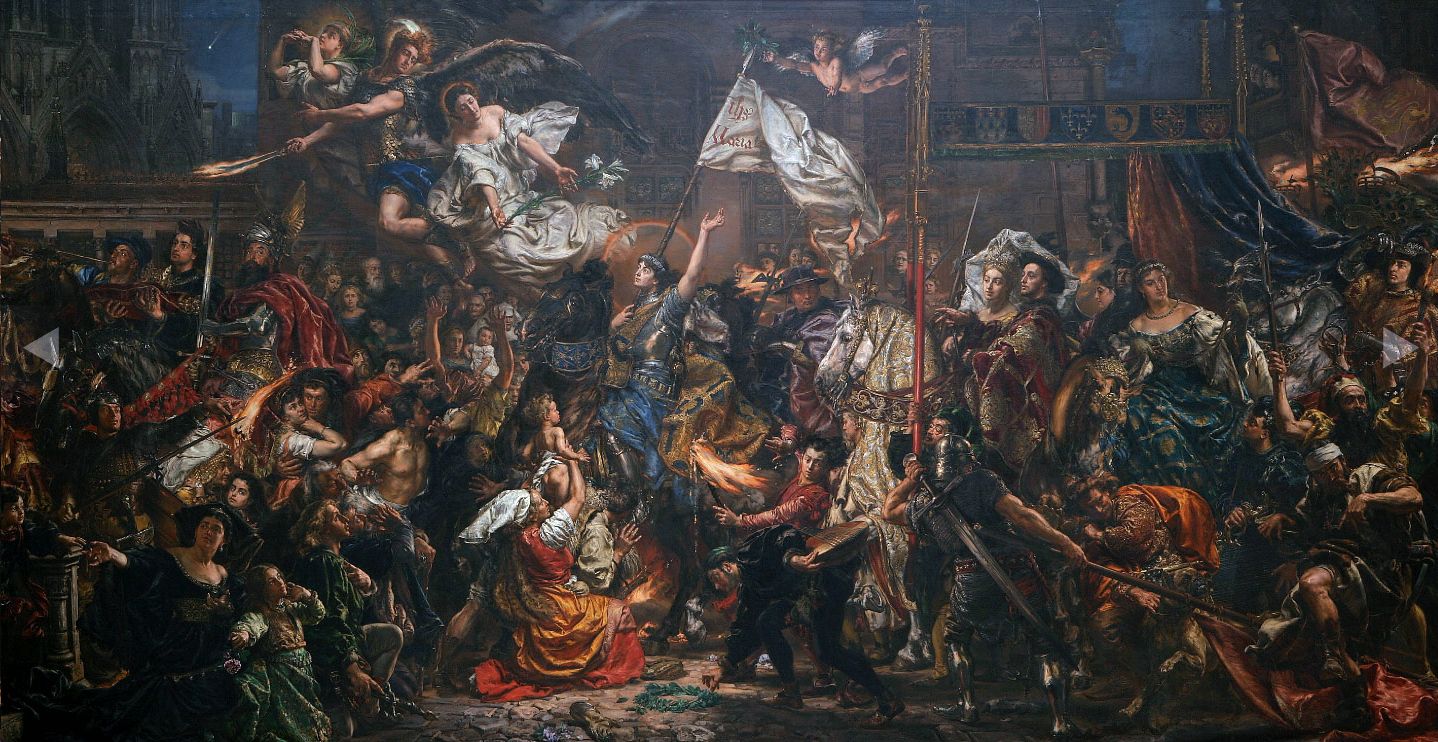
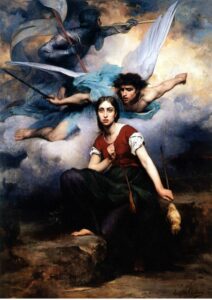 [1]
[1]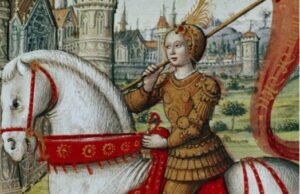 [5]
[5]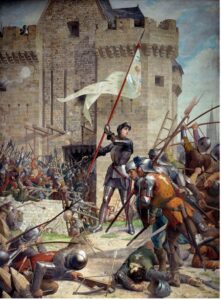
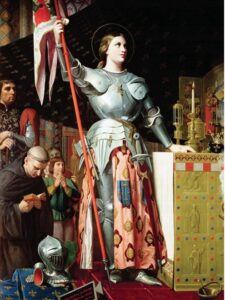 [26]
[26]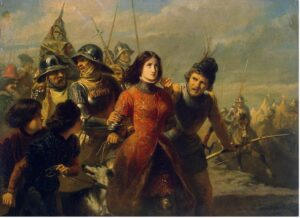 [29]
[29]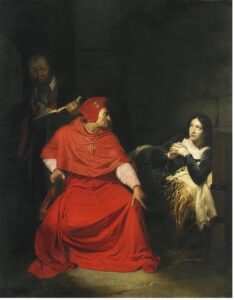 [41]
[41]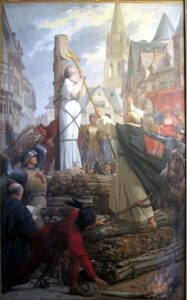 [46]
[46]
Leave a Reply